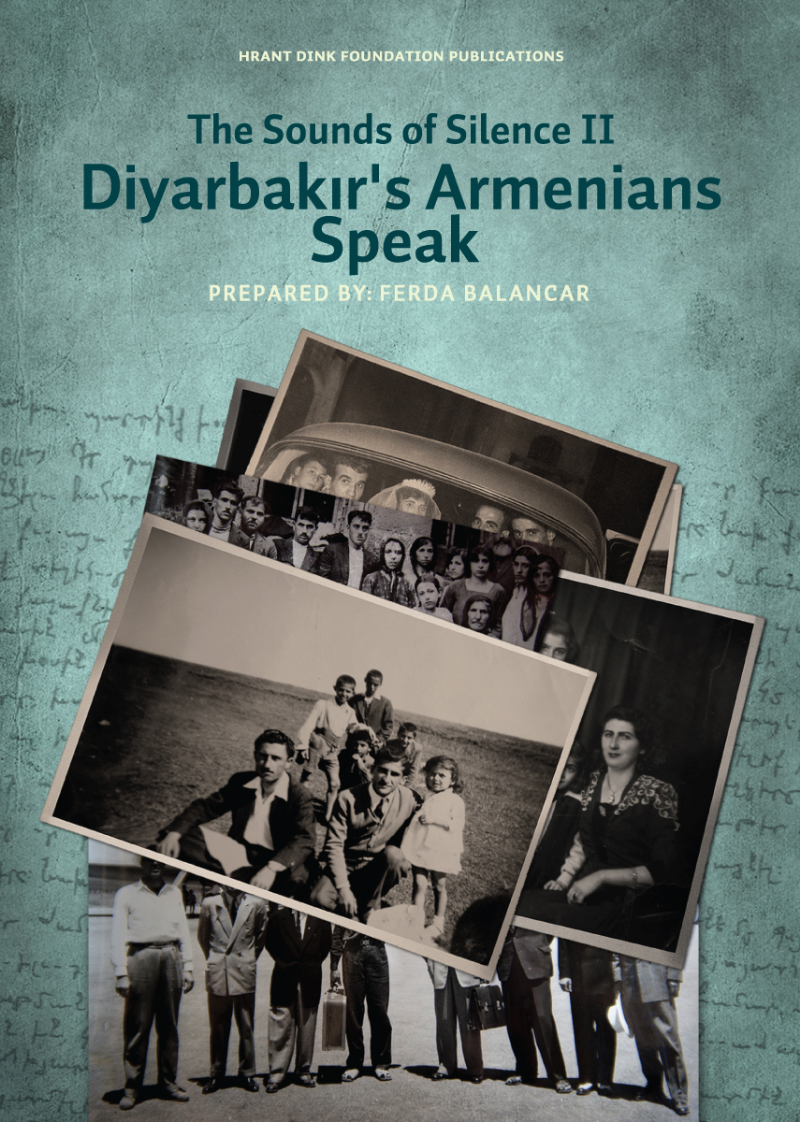
Prepared by
Ferda Balancar
Translation
Nazım Hikmet Richard Dikbaş
Languages
Turkish, English
1st edition - August 2013
232 Pages
Within the scope of this study that traced the tracks of Armenians from Diyarbakır in Turkey, Armenia and the Diaspora, a total of 81 people were interviewed: 22 in Istanbul, 17 in Diyarbakır, 9 in Lebanon, 9 in New York, 4 in Los Angeles, 3 in New Jersey, 7 in Montreal, 6 in Toronto and 4 in Yerevan. 41 of them were female and 40 were male. Among them, there are those who live with their Armenian identity, those who have reclaimed or are trying to reclaim their Armenian identity since being Islamicized, and also who define themselves as both Muslim and Armenian...
Beyond these findings, this study is also an attempt to reimagine, or reconstruct the cultural presence of Armenians in Diyarbakır. For instance, the Surp Giragos Armenian Church in the city had been in use until the 1980s, but later rapidly went to ruin due to the lack of a congregation. Through the collaboration of the Diyarbakır Municipality and Armenian institutions, its recent renovation and reopening for worship bears huge significance in terms of such attempts at reimagination and reconstruction. It is in this sense that this book constitutes another drop in that sea of lost memory.
Ali Bayramoğlu, from the foreword
Reading the narratives in Diyarbakır’s Armenians Speak, I could not help but think about the various twists of oral history. They include ‘the call to truth’ addressed by these life stories to their listener, the expression of different strata of power from an emotion-centred viewpoint, and perhaps also the cynical gaze of this ancient city aimed at us, from above everyone and everything. It is impossible not to feel, in addition to the ‘sound of silence,’ the emotional weight that Diyarbakır lays on our shoulders. Even amidst today’s multi-local localities, we still have cities which manage to be themselves. As the Diyarbakır's Armenians speak, one cannot help but contemplate the new questions posed by ancient secrets that emerge from the city walls.
Arzu Öztürkmen, from the epilogue
Please click here for Diyarbakırlı Ermeniler Konuşuyor - Turkish translation of the book.
- Book name
- Diyarbakır's Armenians Speak
- Subtitle
- The Sounds of Silence II
- Original name
- Sessizliğin Sesi II - Diyarbakırlı Ermeniler Konuşuyor (2012)
- ISBN
- 9786058657052
- Price
- 175 TL
- Pages
- 232
- Width
- 150 mm
- Height
- 210 mm
- Weight
- 408 gr
- Printing
- 1st edition - August 2013
- Language
- İngilizce
- Prepared by
- Ferda Balancar
- Interviews
- Altuğ Yılmaz, Berge Arabian, Ceren Ocak, Dença Kartun, Emine Kolivar, Işınsu Koç, Lora Baytar, Maral Dink, Melisa Bahar, Murat Gözoğlu, Silva Dikmen Özyerli, Tabita Toparlak, Uygar Gültekin, Zeynep Ekim Elbaşı
- Translation
- Nazım Hikmet Richard Dikbaş
- Translation revised by
- Christopher Nicholas Sheklian
- Cover concept
- Sera Dink
- Page layout
- Lora Baytar
- Cover photos
- Berge Arabian
- Printed in
- Mas Matbaacılık
With the contribution of Olof Palme Centre…
- Foreword, Ali Bayramoğlu
- “Your bones are sinful even if you convert to Islam”
- “The departure of the Armenians took Diyarbakır’s soul away”
- “I learned about Armenian history in Los Angeles”
- “My grandfather used to say “Let no one know that we are ‘remnants of the sword’”
- “They made him convert from his religion to Islam, and then wrote ‘convert’ on his identity card”
- “You might forgive them if they apologize, but you can never forget”
- “I am a Muslim, and an Armenian, if you don’t believe me, look at history!”
- “Our Islamicized relatives know 1915 better than we do”
- “If someone feels Armenian then he is Armenian”
- “We do not want it to be forgotten that Armenians lived in Diyarbakır”
- “I am as much Kurdish as I am Armenian, and I am as much Armenian as I am Kurdish”
- “If I were to visit Turkey I would like to begin in Diyarbakır”
- “Our lullabies were in both Armenian and in Kurdish”
- “Although I am a Muslim, I feel like an Armenian”
- “Armenians did not give us a warm welcome, neither in Istanbul, nor in Canada”
- “My mother used to call my father ‘a remnant of the sword, a Muscovite’”
- Epilogue, Arzu Öztürkmen
- Index
